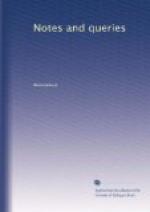The following is the title of the tract referred to by Mr. Rodd:—
“Eyn wolgeordent und nuetzlich buchlin, wie man Bergwerck suchen un finden sol, von allerley Metall, mit seinen figuren, nach gelegenheyt dess gebirgs artlich angezeygt mit enhangendon Berchnamen den anfahanden” and the colophon describes it as “Getruckt zu Wormbs bei Peter Schoerfern un volendet am funfften tag Aprill, M.D.XVIII.”
The Term “Organ-blower.”—In an old document preserved among the archives of the Dean and Chapter of Westminster, is an entry relative to the celebrated composer and organist HENRY PURCELL, in which he is styled “our organ-blower.” What is the meaning of this term? It certainly does not, in the present case, apply to the person whose office it was to fill the organ with wind. Purcell, at the time the entry was made, was in the zenith of his fame, and “organist to the king.” Possibly it may be the old term for an organist, as it will be remembered that in the fifteenth century the organ was performed upon by blows from the fist.
At the coronation of James II., and also at that of George I., two of the king’s musicians walked in the procession, clad in scarlet mantles, playing each on a sackbut, and another, drest in a similar manner, playing on a double curtal, or bassoon. The “organ-blower” had also a place in these two processions, having on him a short red coat, with a badge on his left breast, viz. a nightingale of silver, gilt, sitting on a sprig.
In a weekly paper, entitled the Westminster Journal, Dec. 4. 1742, is a letter subscribed “Ralph Courtevil, Organ-blower, Essayist, and Historiographer.” This person was the organist of St. James’s Church, Piccadilly, and the author of the Gazetteer, a paper written in defence of Sir Robert Walpole’s administration. By the writers on the opposite side he was stigmatized with the name of “Court-evil.”
At the present time, as I am given to understand, the organist of St. Andrew’s Church, Holborn, is styled in the vestry-books, the “organ-blower.”
EDWARD F. RIMBAULT.
“Singular” and “Unique.”—The word singular, originally applied to that of which there is no other, gradually came to mean extraordinary only, and “rather singular,” “very singular indeed,” and such like phrases, ceased to shock the ear. To supply the vacancy occasioned by this corruption, the word unique was introduced; which, I am horror-struck to see, is beginning to follow its predecessor. The Vauxhall bills lately declared Vauxhall to be the “most unique place of amusement in the world.” Can anything be done to check this ill-fated word in its career? and, if not, what must we look to for a successor?
M.
* * * * *




